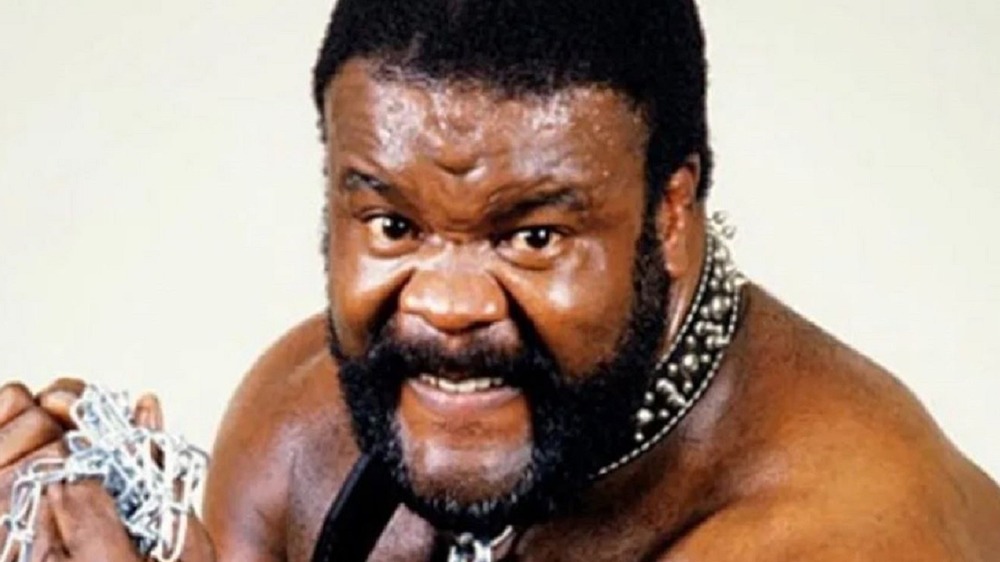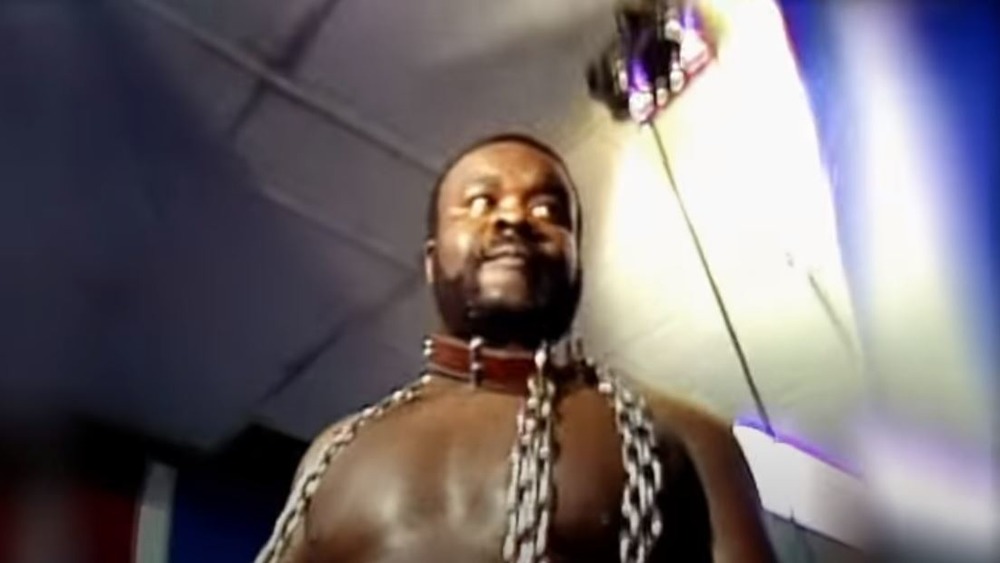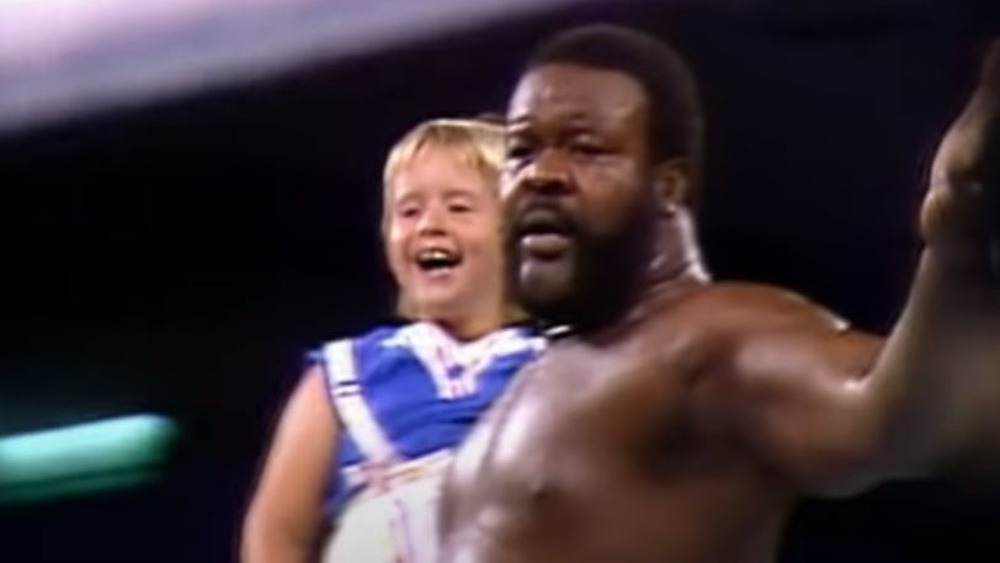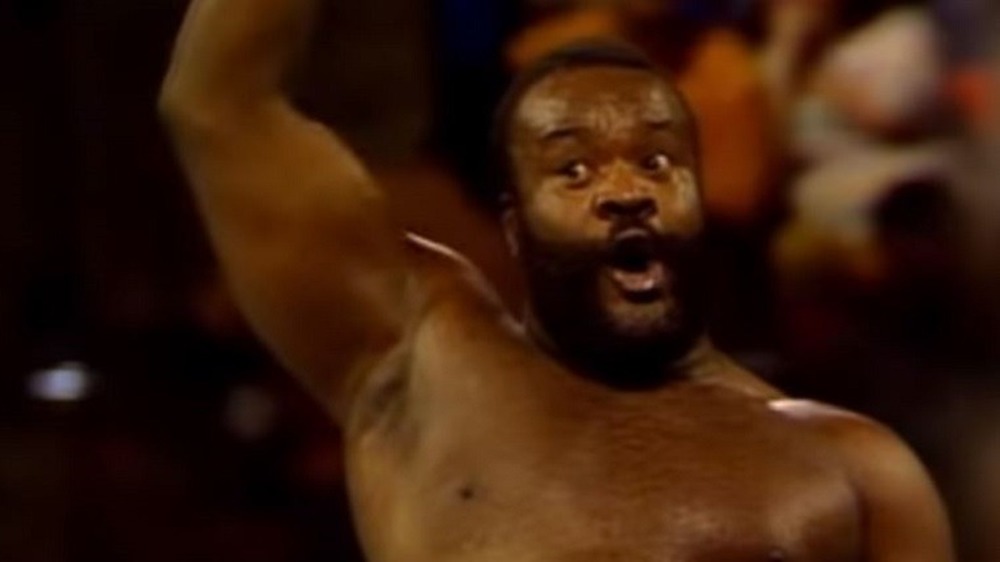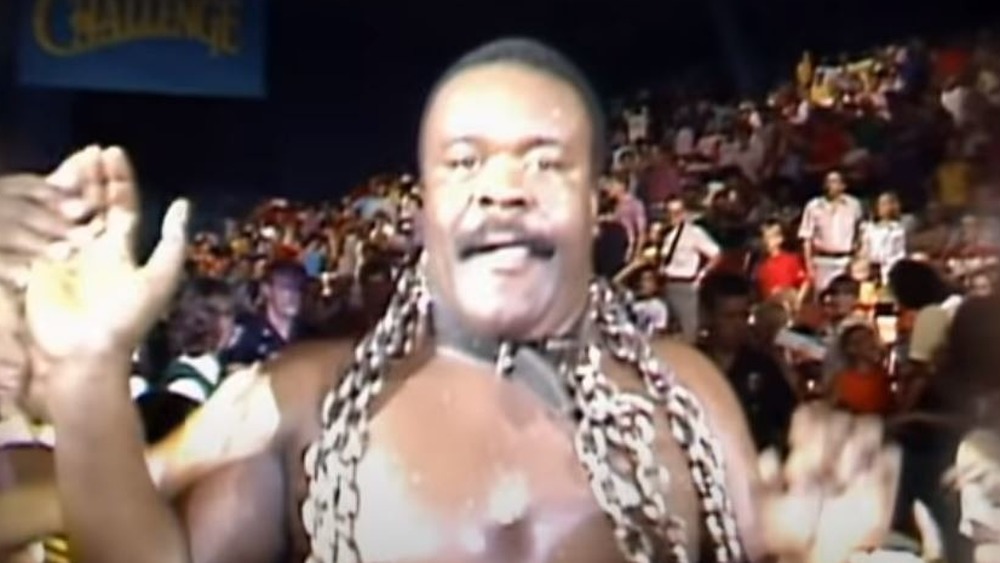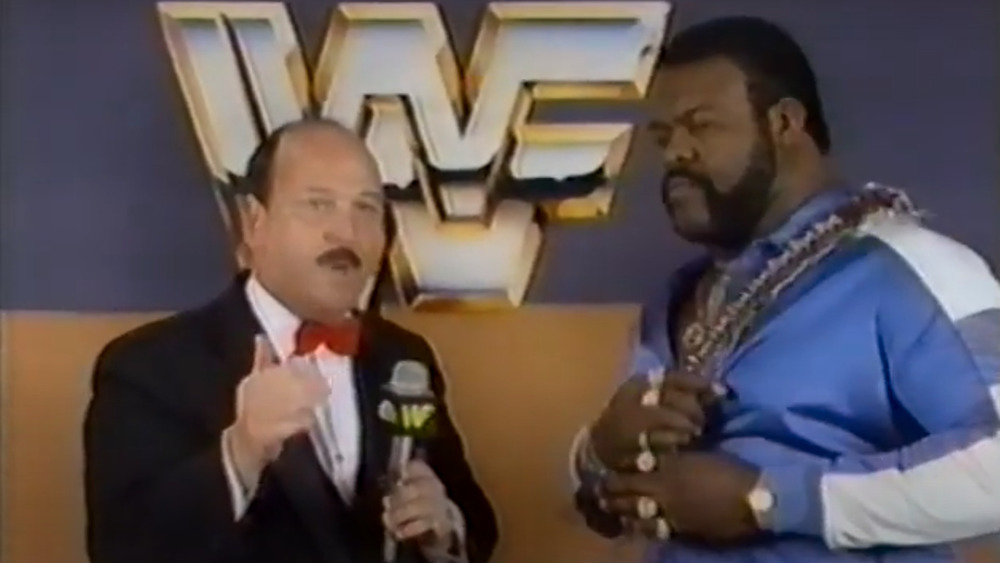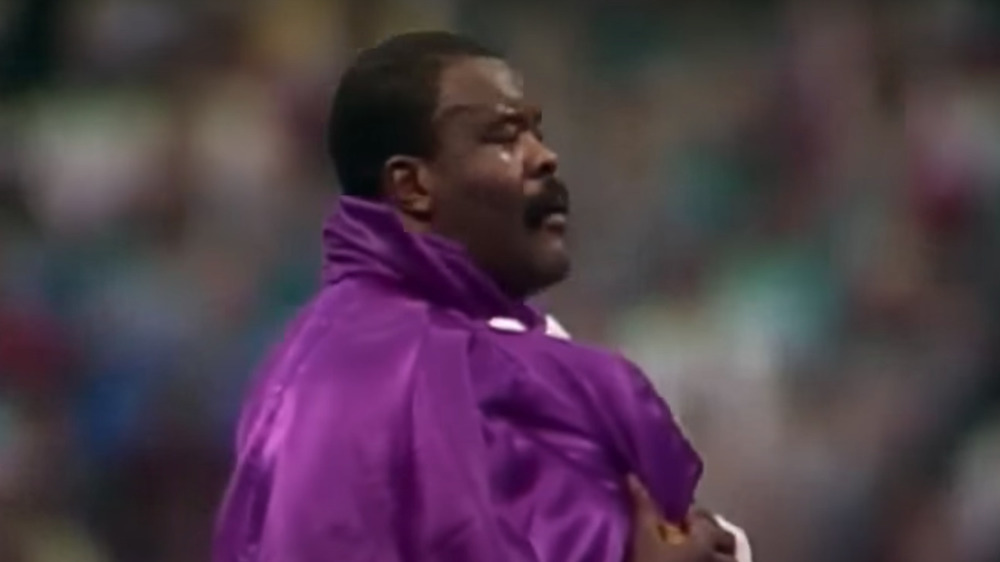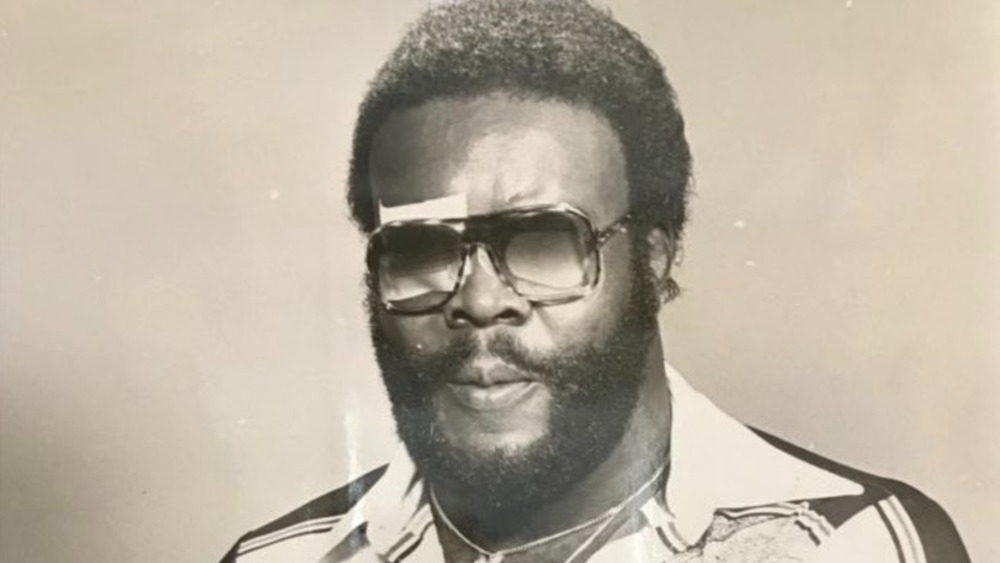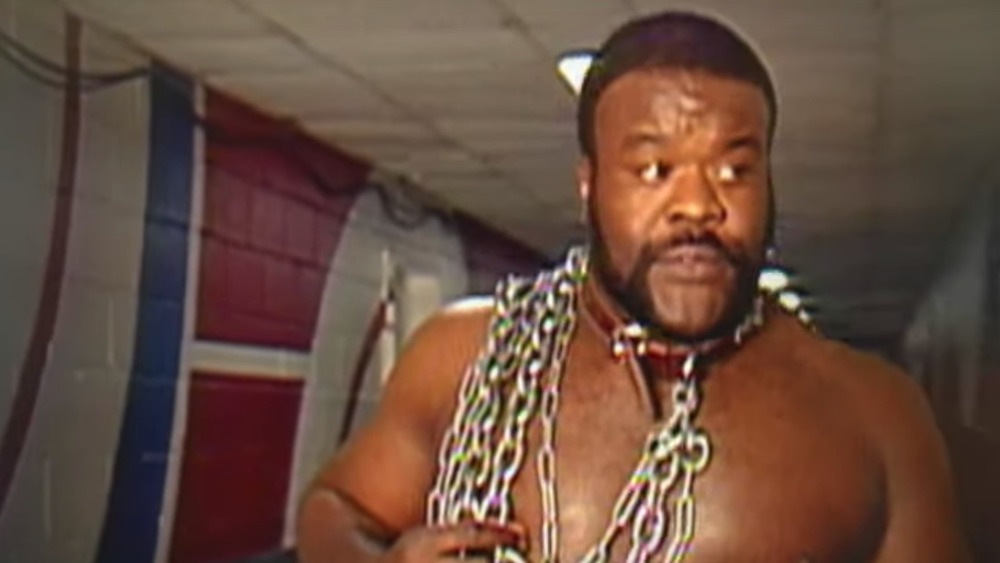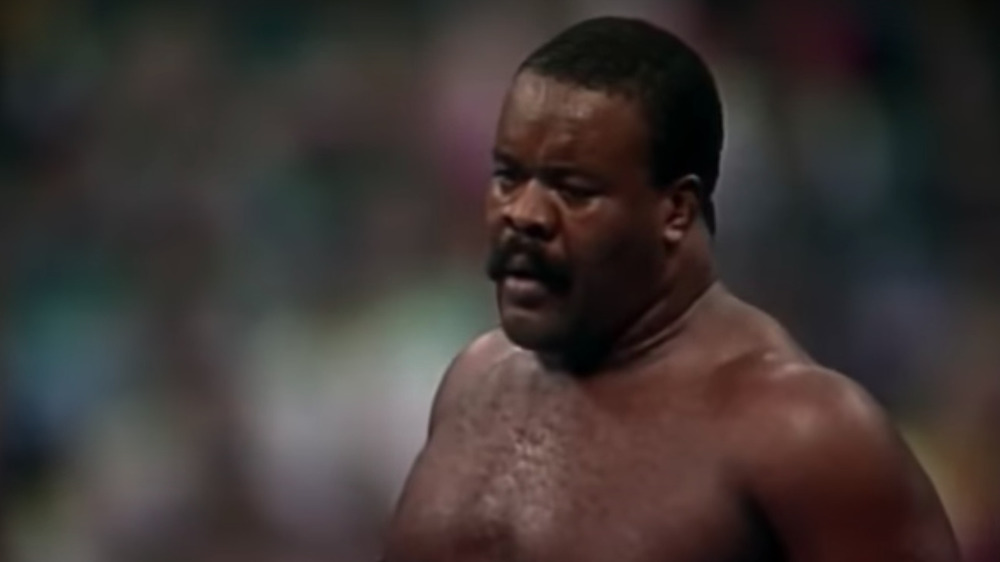The Tragic Real-Life Story Of Junkyard Dog
A professional wrestler is said to be "over" when the audience is invested in their character, in-ring talent, or ideally both. If the wrestler is good and charismatic enough to incite these reactions, they may even become one of the rare names that even the people who don't follow the strange world of pro wrestling are familiar with. This level of fame is usually reserved for the absolute best and brightest to ever step in the squared circle, from crossover stars like Dwayne "The Rock" Johnson and Dave Bautista to tenured cream-of-the-crop performers like Ric Flair. Which makes it all the more surprising that Junkyard Dog isn't a bigger name than he is.
In his heyday, Sylvester "Junkyard Dog" Ritter was so over with the fans that he could give Hulk Hogan a run for his money. He was a massive man with a peculiar, dog-themed ring persona, a tendency to wear a dog collar and sturdy chains, and a no-nonsense wrestling style that was best epitomized in his finisher — a painful-looking powerslam that he simply called "Thump."
Junkyard Dog may seem like an odd character, but Ritter was so intense and charismatic that the fans absolutely ate it up. However, thanks to a multitude of unfortunate twists and turns, he never quite reached his full potential — in his professional and personal life alike. Let's take a look at the tragic real-life story of Junkyard Dog.
Junkyard Dog was held back by the WWF
Junkyard Dog was a talented performer with a raw, natural charisma that could arguably match most every other performer of his era. As such, it can seem strange that his time with the WWF (the former name of WWE) wasn't more stellar. As Bleacher Report tells us, the wrestler was easily the biggest star of Mid-South wrestling, and even when he moved to the WWF, the audience was known to go nuts whenever he appeared. In fact, Junkyard Dog could easily drive the crowd as wild as some of the best and the brightest out there. Per Wrestling Observer, he could even outshine an all-time great like Ric Flair. "I've never seen anyone who over was like Junkyard Dog in his prime," wrestler Buddy Landel has said. "I was never around Hogan in his prime, but I was around Ric Flair in his peak and he was never over like JYD."
Unfortunately, for one reason or another, the WWF never quite capitalized on Junkyard Dog's sheer magnetism and popularity with the fans. Though his tenure with the company involved some high-profile opportunities — including tag-team bouts with Hulk Hogan himself — he was generally treated as a mid-level talent, and his WWE wrestler profile readily reveals that he never won a single WWF championship. While Junkyard Dog was eventually inducted into the WWE Hall of Fame, his actual time with the company seems to have largely ignored his potential as a top star.
Junkyard Dog had to face racism
The term "workplace harassment" takes on a whole new meaning when you work as a pro wrestler, and your very job description is "throw your colleagues around." Combine this with the fact that the professional wrestling culture is historically quite racist, and that wrestling storylines can get pretty controversial – and you can probably guess what life could be like for an African-American wrestler in the 1980s.
As Grantland tells us, Junkyard Dog was a charismatic guy, but that didn't make him exempt from casual, sometimes cruel racism. In the WWF, commentator Jesse "The Body" Ventura referred to his popular post-victory dance as "a lot of shuckin' and jivin'," and claimed that his speech sounded like he had "a mouth full of grits." Even his super-popular stint with Mid-South Wrestling was somewhat marred with this. As Deadspin points out, Junkyard Dog's opponents could be quite racist against him, and what's more, he didn't exactly choose those chains as his gimmick — a wrestling promoter called Bill Watts came up with the idea.
Fortunately, Junkyard Dog was often able to work with the flip side of the coin. Since he was invariably the "babyface" (good guy) of the feud, and his opponents were often rather openly racist against him, it could lead to a situation in which he was a heroic figure fighting against racial injustice, and the crowd was cheering him.
Junkyard Dog's heyday was fueled by cocaine
Substance abuse is a notorious issue with many wrestling stars, and Junkyard Dog was no exception. Per The Wrestling Movement, his struggle with addiction started in the 1980s, when he — like many other stars of the era — operated with the aid of copious amounts of narcotic substances, which you could occasionally hear during some of his more ... energetic speeches. According to Wrestling Observer, cocaine was Junkyard Dog's go-to vice, and he soon developed a habit that caused him to neglect training. His promoter at the time, Bill Watts, tried to protect his top name, whose wrestling ability was rapidly declining and whose significant weight gain soon destroyed his hitherto impressive physique. However, it was clear that Junkyard Dog had problems that went way beyond his in-ring prowess.
Perhaps the best description of Junkyard Dog's relationship to drugs comes from the Iron Sheik, a fellow wrestling legend who's also had copious problems with addiction ... and who, according to Maxim, got his first taste of crack courtesy of Junkyard Dog. "He my friend," the Sheik has said. "But he no perfect."
The sad decline of Junkyard Dog
As years went by, Junkyard Dog's lifestyle started to take a toll on his body. According to The Wrestling Movement, his cocaine and alcohol use were weighing him down, both in the ring and outside it. As Wrestling Observer notes, his increasing sloppiness severely hurt his popularity at Mid-South Wrestling, and though the WWF eventually hoisted him to bigger and more visible arenas, the wrestler's personal struggles continued. He also complemented his substance abuse with a propensity for unhealthy eating, which earned him the unsavory nickname "Junkfood Dog."
Over time, Junkyard Dog's professional mentality started to creak under his many excesses. Even as he started skipping scheduled appearances, the WWF gave him some leeway — but ultimately, they decided to let him go. In 1988, Junkyard Dog joined the rival promotion WCW, but both his star power and performances were disappointing, and he left in 1991 for the independent circuit and relative obscurity.
To his credit, Junkyard Dog was (at least eventually) more or less aware of his situation, though he was never able to get fully clean. In his later years, he was quite open about his addictions and the toll they had taken on him. In fact, his friend, "Million Dollar Man" Ted DiBiase, has revealed that shortly before Junkyard Dog died, he gave DiBiase permission to use him as a warning example to steer kids toward better life choices.
Junkyard Dog's marriages fell apart
A pro wrestling lifestyle can be hard on a marriage, and as Wrestling Observer tells us, Junkyard Dog's two marriages went to rocks so hard that one of them involved a kidnapping and a gunshot. The details of his first divorce are somewhat unclear, but his arduous travel schedule seems to have played a large part. However, the story comes with a dark epilogue. His wife reportedly had mental health issues and spent some time at a mental institution — after which, she kidnapped their daughter from Junkyard Dog's parents' house. On his quest to find his daughter, the wrestler soon burst through the door of his ex-wife's brother's house, and the ensuing confrontation ended with said brother — a police officer — receiving an accidental gunshot wound.
The end of Junkyard Dog's second marriage didn't involve quite as much drama, but it was extremely devastating to his finances. In fact, he reportedly lost pretty much all his earthly possessions, up to and including his car and home.
Junkyard Dog's modest retirement years
Sooner or later, for one reason or another, every pro wrestler hangs up their boots. Unfortunately, Junkyard Dog's retirement years were even more tragic than usual. The fallen star might have had a successful and lucrative wrestling career, but according to The Wrestling Movement, he didn't have much to show for it in his later years. In fact, he spent much of his post-wrestling time doing odd jobs in different places, with no permanent home.
Perhaps understandably given his life outside of it, Junkyard Dog clung to wrestling as long as he could, pleading for chances from his former promoters in vain and appearing in occasional independent shows to a point that his declining in-ring ability allowed. This may have been a money thing, but according to Sportscasting, his sheer love for the job seems to have been a significant factor, as well. "He retired in 1988 and 10 years later he was still in the ring," promoter Guy Walters has said. "He had a hard time giving it up. He enjoyed it all, the big crowds, [the] small. It didn't make any difference, as long as he was around to sign autographs and take Polaroids with the kids." Walters also revealed that Junkyard Dog made sure to tell said kids to make better life choices than he had. "Every kid he met, he'd say, 'Are you still in school? Stay there. Baby. Do it.'"
Junkyard Dog's surprisingly dangerous storyline
As Pro Wrestling Stories tells us, Junkyard Dog was a very, very popular wrestler in his prime. In fact, he was so popular that it could be outright dangerous to everyone involved. During his days in the Mid-South, he was a hero who used Queen's "Another One Bites The Dust" as his entrance music and was loved by all — almost too much. One of his stranger feuds at the time was a storyline angle that saw his enemies, the Fabulous Freebirds, "blind" Junkyard Dog with hair cream. This coincided with the real-life birth of his daughter, and the prospect of the heroic wrestler not being able to see the baby got the crowds very, very mad. So much so, in fact, that the Freebirds soon needed police protection.
As Wrestling Observer notes, the story almost ended in a disaster when the "blind" Junkyard Dog took the ring to address his adoring audiences, some of whom were apparently convinced that he had actually lost his sight and had to leave the business for good. How convinced? Well, when the Freebirds inevitably entered the ring to gang up on the "helpless" Junkyard Dog, one fan actually entered the fray and pointed a gun at one of them, yelling, "Don't worry Dog, I'm covering you!"
Fortunately, no one was shot that night. Unfortunately for the gun-toting fan, though, the security overpowered him and took him away — presumably, to receive the beating of a lifetime.
Junkyard Dog died in a car accident after missing his daughter's graduation
The final tragedy in Junkyard Dog's life came in the summer of 1998, was twofold, and happened over a single weekend. As Wrestling Observer reports, he made an attempt to attend the high school graduation ceremony of his daughter, only to find out that he'd arrived too late, and she had already gone to celebrate with her friends. He never saw his daughter again. On the morning of June 1, Junkyard Dog started his journey back, but as Pro Wrestling Stories tells us, he never made it. As he was driving the Interstate 20, Junkyard Dog died in a single-car accident that sent his vehicle rolling three times. He was 45 years old.
Five days later, the pro wrestling star was buried in Wadesboro, N.C. Apart from his former comrade Buddy Landel and a few flowers and addresses, the professional wrestlers he'd worked with all his life were largely absent from the ceremony. However, the Junkyard Dog's impact was still clear, as the crowd that attended the funeral was up to 2,000 strong — and a certain high-profile fan called Michael Jordan reportedly reached out to give his condolences.
The tragic death of Junkyard Dog's daughter
Through no fault of her own, Junkyard Dog's daughter, LaToya Ritter, was instrumental in many dramatic turns of her father's life. According to Wrestling Observer, her father's inability to see her was a major part of the infamous "blindness" storyline during Junkyard Dog's Mid-South days. Ritter's graduation weekend in 1998 also ended with her father's fatal single-car accident. As Pro Wrestling Stories tells us, she was also the one who represented Junkyard Dog in 2004, when he got the WWE Hall of Fame nod.
Unfortunately, like her father, Ritter also passed away at an early age. On Oct. 19, 2011, she was talking on the phone, when she had a sudden heart attack at just 31 years old. "Doctors said she was gone before she hit the floor," a family friend said. "As tragic as her loss is, there's consolation in the knowledge that she didn't suffer."
